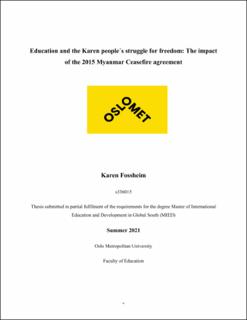Education and the Karen people´s struggle for freedom: The impact of the 2015 Myanmar Ceasefire agreement
Master thesis
Published version
Permanent lenke
https://hdl.handle.net/11250/2976330Utgivelsesdato
2021Metadata
Vis full innførselSamlinger
Sammendrag
After a long history of ethnic conflict in Myanmar, a nationwide ceasefire agreement was signed on 15th October 2015 between the national government and representatives of Ethnic Armed Organizations (EAOs). Among of the EAOs was the Karen National Union (KNU), being the oldest revolutionary group in Myanmar that has been struggling for independence, for self-determination, and equality. This study examines the educational experience of the Karen people, and specifically some of the educational initiatives and interventions of the Karen resistance group, in relation to their struggle to maintain their independent ethnic and linguistic identity. The study focused on developments since and impacts of the 2015 ceasefire agreement on the Karen community for their education. This extends to consideration of possibilities for Karen education within the mainstream Burmese education system, based in some consideration of the multiple challenges that Karen students have faced throughout this long conflict. Policy issues that need to be addressed are identified, including access and participation in higher education, inequities between Karen and other student groups, language of instruction, and possibilities for dedicated Karen educational institutions. The project concludes by noting the current instability in Myanmar and the associated military coup on 1st February 2021, with implications for the ceasefire agreements and for the ongoing struggle of the Karen people.
